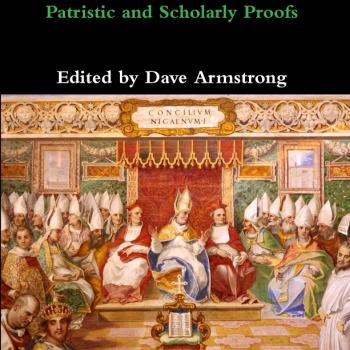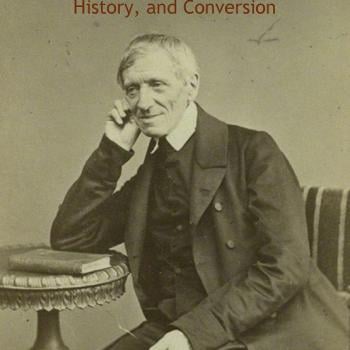Two days ago I posted my article, Christmas & Dec. 25th: Not Derived from Saturnalia (Nor from Sol Invictus . . .). In it, I included one of the earliest (in the opinion of many, including Pope Benedict XVI, the earliest) written Christian confirmations that the birthdate of Jesus was believed to be on December 25th. It came from the Church father Hippolytus (c. 170 – c. 235):
For the first advent of our Lord in the flesh, when he was born in Bethlehem, was December 25th. (Commentary on Daniel [4.23.3; written in 204 AD]
Unfortunately, there is scholarly dispute as to the authenticity of this citation. The entire manuscript of the commentary was only discovered in 1885, so that the famous late 19th century Schaff 38-volume set of the Church fathers did not contain all of it, including the citation in question. The Catholic Encyclopedia (“Christmas”) was aware of the citation in question in 1908:
Were the Chalki manuscript of Hippolytus genuine, evidence for the December feast would exist as early as c. 205. The relevant passage [which exists in the Chigi manuscript Without the bracketed words and is always so quoted before George Syncellus (c. 1000)] runs:
He gar prote parousia tou kyriou hemon he ensarkos [en he gegennetai] en Bethleem, egeneto [pro okto kalandon ianouarion hemera tetradi] Basileuontos Augoustou [tessarakoston kai deuteron etos, apo de Adam] pentakischiliosto kai pentakosiosto etei epathen de triakosto trito [pro okto kalandon aprilion, hemera paraskeun, oktokaidekato etei Tiberiou Kaisaros, hypateuontos Hrouphou kai Hroubellionos. — (Comm. In Dan., iv, 23; Brotke; 19)
“For the first coming of Our Lord in the flesh [in which He has been begotten], in Bethlehem, took place [25 December, the fourth day] in the reign of Augustus . . .
Patristics expert Roger Pearse examined the issue of manuscripts for this work, in great depth. See yet more on that topic.
The first complete English translation of Hippolytus’ Commentary on Daniel appeared in 2010, from Thomas C. Schmidt. A person commenting on this new translation wrote:
Hippolytus . . . claims that the birthday of Jesus is December 25th. If this indeed is the case, it shows that the tradition of December 25th was present in the early third century and not the result of 4th century Christians allegedly adopting the pagan feast, Natalis Sol Invicti, as the birthday of Christ.
Unfortunately, it can’t be searched on either Amazon or Google Books. I discovered that the book has an Appendix 1 entitled: “Hippolytus and December 25th as the date of Jesus’ birth” (pp. 181-222). I was able to access almost all of the book, minus the two appendices.
Drats! Foiled again! After more searching, however, I did discover translator Schmidt’s own opinion of the more general question of Hippolytus’ opinion on the date of Christmas, in his article entitled, “Calculating December 25 as the Birth of Jesus in Hippolytus’ Canon and Chronicon“ (Vigiliae Christianae 69 [2015] 542-563). Here, Dr. Schmidt from Yale (see his Curriculum Vitae) argues for the affirmative:
This article argues that around 235 CE Hippolytus of Rome placed the birth of Jesus on December 25. While this has been theorized in the past, this article brings forward hitherto unheralded evidence about Jesus’ birth from Hippolytus’ Canon and his Chronicon. . . .
[I]n his Chronicon Hippolytus placed Jesus’ birth exactly nine months after the anniversary of the world’s creation. Calculations in his Chronicon and Canon indicate that Hippolytus thought the world was created on March 25, meaning that he likely believed that Jesus was born on December 25. . . .
I must briefly discuss the authorship of the Hippolytan corpus. Though its authors or author has been the subject of much debate, scholars are united in believing that the same author wrote the Canon, and the Chronicon, the two works with which this paper is concerned. . . .
According to this reconstruction, Hippolytus would therefore have believed that Jesus was born nine months after the anniversary of the creation of the world. If Hippolytus followed early Christian chronologists in believing that the world was created on or near both the Passover and the Vernal Equinox, he then would have believed that Jesus was born sometime around December 25. . . .
Hippolytus’ use of the Roman calendar and its placement of the Vernal Equinox on March 25 is therefore a key reason why he seems to have chosen December 25 as the birthday of Jesus. While it seems probable that Hippolytus himself chose December 25, if he did not, then it is clear that the slightest manipulation of his methods would have easily resulted in its selection.
Nothaft has recently argued that Julius Africanus most likely also chose December 25 in 221 CE using similar methods. This, coupled with Hippolytus’ probable choice around the same time, further argues that the selection of December 25 as the birthday of Jesus occurred sometime in the early third century, more than 100 years before its earliest explicit attestation in the Chronography of 354.
If we accept the above analysis, then it is more plausible and likely that Hippolytus also expressed the same opinion in his Commentary on Daniel, and that the disputed manuscript where he did exactly that is indeed accurate and not merely an interpolation or mistake in transmission.
***
Photo credit: The Adoration of the Shepherds (c. 1650), by Matthias Stom (fl. 1615-1649) [public domain / Wikimedia Commons]
***
Summary: I document Hippolytus (c. 170- c. 235) holding to a December 25th Christmas, over a hundred years before the widely alleged first Christian mention of this date.














